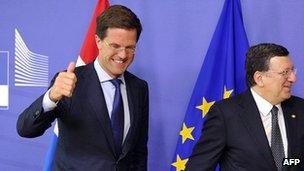Dutch government review criticises EU powers
- Published

The Dutch leader (left) is a potential ally of David Cameron in the EU reform debate
The Dutch coalition government says the time of "ever closer union" in all EU policy areas is over.
The government, led by liberal Prime Minister Mark Rutte, set out its stance on EU powers in a letter to parliament.
The Netherlands wants to keep control over social security, working conditions and media regulation.
The initiative is similar to the UK government's current "balance of competences" review, aimed at assessing where EU powers may extend too far.
Mr Rutte formed a coalition with the centre-left Labour Party after narrowly winning an election last October.
The Dutch coalition is seen as generally pro-EU and pro-austerity. It is not preparing the ground for a referendum on EU membership, in contrast with Prime Minister David Cameron's Conservatives in the UK.
But the Dutch government website said , externalthe letter, presented by Foreign Minister Frans Timmermans, would feed into broader discussions on EU powers in Europe.
"The Netherlands is convinced that the time of an 'ever closer union' in every possible policy area is behind us," the website said, reporting the letter.
In his landmark Europe speech , externalin January, Mr Cameron also challenged the EU's "ever closer union" commitment - a phrase used in the Lisbon Treaty, which is the 27-nation bloc's rulebook.
Sovereignty debate
The Netherlands, Germany and Sweden are often seen as close to UK positions on the EU, especially on market liberalisation, free trade and budget austerity in the current crisis.
But there is also concern in the EU that British Euroscepticism may result in the UK leaving, while eurozone countries integrate their economic policies.
The Dutch letter did not call for EU treaty change, but said there were various "issues which the Netherlands believes could be left more or less entirely to member states: halting the further harmonisation of social security systems; working conditions, which should only be regulated in broad outline; no EU regulation of media pluralism; flood risk management should only be harmonised at European level for truly trans-boundary water courses; phase out the EU programmes for school milk and school fruit."
It said strong European co-operation was still vital in responding to the economic crisis and challenges such as energy, climate change, asylum and migration, the internal market and defence.
The full text of the letter , externalwas carried by the Open Europe think tank on Friday.
Commenting on the Dutch review of EU powers, Open Europe director Mats Persson said it was "broadly positive news for Cameron's chances of achieving a new deal in Europe, and shows that discontent with the EU status quo is not simply a UK phenomenon.
"Countries like Sweden and Germany are also far more likely to be persuaded down the reform path if the Dutch are prepared to take a lead, with the UK. However, the fact that the Dutch have dismissed EU treaty change is clearly a problem for Cameron," he said.
Peter Wilding, head of the lobby group British Influence, said the letter "shows real momentum in Europe to seek practical reforms which, if carried through by other member states, could help to create a better EU for Britain".